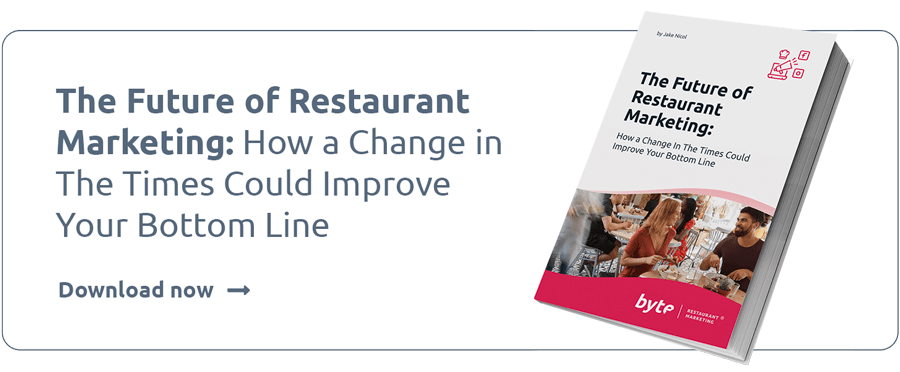Three Principles For Growing Your Restaurant’s Brand
The challenge of growing a restaurant brand today is staggering: from rapidly expanding and increasingly diverse competition to economic uncertainty and changing consumer habits, creating a real niche for your restaurant has become both more difficult and more vital.
But while the majority of chains approach the problem as if it can be solved through investment in technology or corporate efficiency, small and independent restaurants have an opportunity to build their brand in a different way.
The human element of an independent business is always its greatest strength, and learning to leverage that will be key to success. This will involve embracing a marketing mindset and actively building a brand that reflects your restaurant’s unique appeals. But for many, doing so can be a daunting, devastating task.
Marketing is a broad, multifaceted field, and that can lead business leaders to get lost trying to figure it out. So rather than leaving you to sift through the endless mountain of theories and concepts, we’ve put together our Three Principles of Marketing, to help guide independent restaurants grow their brand better.

Think in moments
Great customer experiences don’t just create a happy customer – they create loyal brand advocates. Positive word of mouth is still the most powerful source of brand growth in hospitality, and positive word of mouth is most likely to be created by delivering memorable, showstopping moments for your customers.
Now, we tend to think of memorable ‘moments’ as spontaneous and natural – you have to ‘be there’ to understand them. But the truth is moments like this follow recognisable patterns. And therefore you can rapidly increase their frequency simply by consciously looking to create them.
‘Breaking the script’ and exceeding expectations; instilling a sense of pride in customers; creating an emotional connection: these are all tried and tested ways of producing real ‘moments’.
Thinking in moments means approaching every aspect of your customers’ experience – from online booking to serving the bill – with a mindset of: how can we elevate this interaction to make it memorable and delightful?
And the inherent intimacy of small, independent restaurants means creating these human moments is not only easier – they have more impact when you do.

Do more with less
Independent restaurants simply cannot compete with chains in terms of cutting-edge technology. But nor should they want to.
While large chains compete with each other to get the most up-to-date digital gadgets, smaller restaurants have room to make use of their limited capabilities in more creative and agile ways. While the future of huge international businesses might be state-of-the-art digital ordering technology, the human element of small restaurants is their greatest asset.
51% of customers said online reservations is the most important tech a restaurant needs in 2020.
Rather than looking to jump on every trend, your restaurant needs to carefully strategise and funnel its resources into the areas which will be most appealing to their specific customer base and build the kind of brand you want to be.
Integration is key here: you can do more with less by finding actions and solutions which cover multiple needs.
For example: treating your staff better will encourage them to work harder and be better at their jobs, but if you can find a way to demonstrate this publicly you will also build empathy and trust with your customers.
Thinking this way will help you be more agile and adaptable, as well as hopefully cultivating the kind of entrepreneurial, self-starting culture which makes for great service.

Respond to needs
Creating moments and being resourceful are important, but it’s all for nothing if you aren’t doing those things in service of your customers’ needs. And with growing consumer expectations and competition, there are far more needs to respond to today than ever before.
There are dietary requirements; ethical demands; digital expectations; and that’s on top of the baseline expectation of personalised, personable experiences.
Focusing all your energy on responding to the needs of consumers means constantly looking at your customers and the larger culture to find new and exciting ways to give them; it means giving them something different and using what’s available to you in a way which serves the largest segment of your customer base.

If your customers are taking a lot of photos: find a way to interact with them while they take them and encourage them to tag your restaurant online.

If your customers are particularly health-conscious: do everything you can to add more healthy options to your menu and advertise this fact as widely as you can.
Data will soon play a more and more significant role in responding to consumers’ needs effectively. Rather than simply responding to individual customers and using intuition, successful restauranteurs need to be able to recognise needs as quickly as possible. This will allow them to be agile and adaptable, so they can meet their specific customers’ needs as quickly and effectively as possible.
Because to put it bluntly, if you don’t respond to the changing needs of your customers, some newer, more agile business will come along that does.

This blog is excerpted from our recent E-book publication, The Future of Restaurant Marketing. Please click here to download the full book for free.